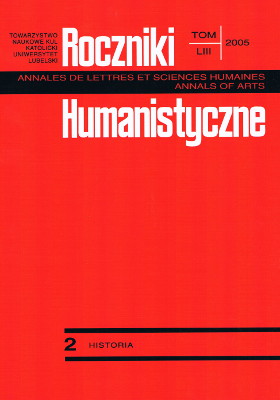Josefa Paternó y Maroto in the Light of Her Letters to Her Brother (1824-1858)
Abstract
The present article shows a portrait of the Spanish woman, Josefa Paternó y Maroto on the basis of her private letters to her brother Ramon, which she wrote in the years 1824-1858. The fact that they have not been studied yet by any researchers proves their great value and even uniqueness; and also that contrary to other European countries, like France or Poland, in Spain, until the break of the 19th century there are only few epistolary sources written by women. Josefa Paternó belonged to the middle class, but she boasted of gentry roots. Her psyche and her emotional spheres were typical of women of the Romantic epoch. On the other hand, she had features that do not often occur in women of her circles, and ones characteristic of the next generation. This interpenetration of elements belonging to the borderland of two epochs allows defining Josefa as a woman of transformation, that is one who did not quite fit the traditional model of the guardian of the home, but was not yet an emancipated woman. Occurrence of this phenomenon only in a few cases resulted from women's conscious striving after changing their status; usually it was pressure of the reality surrounding them, the reality that was inevitably tending towards capitalism and formation of a liberal society. As an unmarried woman Josefa is a perfect example of a single woman who struggled with the many problems of everyday life, and at the same time of a person open to the needs of other people, especially members of her family.
References
Del Marco M. C., Las mujeres del Romanticismo, t. I, León 1969.
Arrom de Ayala A., Antonio Arrom y Ayala, primer cónsul de España en Australia (1853-1859) y su esposa Cecilia Böhl de Faber, Madrid 1988.
Miłkowski T., Machcewicz P., Historia Hiszpanii, Wrocław 1998.
Tuñon de Lara M., ValdeónBaruque J., Domínguez Ortiz A., Historia Hiszpanii, przeł. Sz. Jędrusiak, Kraków 1997.
Kieniewicz J., Hiszpania 1814-1844. Koniec „starego ładu” i początki zacofania, w: Europa i świat w epoce restauracji, romantyzmu i rewolucji 1815-1849, red. W. Zajewski, Warszawa 1991, s. 365-398.
PérezMolina I., Las mujeres ante la ley en le Cataluña moderna, Granada 1997.
MartinGaite C., Usos amorosos del dieciocho en España, Madrid 1972.
Copyright (c) 2005 Roczniki Humanistyczne

This work is licensed under a Creative Commons Attribution-NonCommercial-NoDerivatives 4.0 International License.





